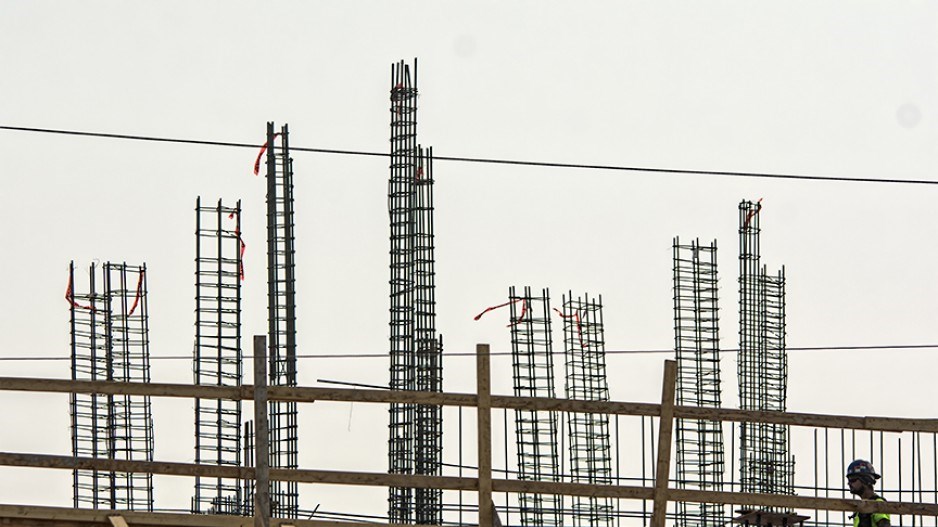A spike in imported steel prices, higher lumber costs and rising labour rates could threaten the speculative building that dominates Metro Vancouver’s development industry.
It is already being partially blamed for the shutdown of three residential condo towers.
Of the 25 major industrial projects underway across the Metro region, all but three are speculative plays, and the majority of the developers are trying to pre-sell rather than lease the space. Of the 10 biggest office projects planned for downtown Vancouver, half have no space sold or leased and only two are fully booked.
Due to new U.S. tariffs, the price of steel rebar, a key building component in concrete construction, had increased 58% as of August compared with a year earlier, said Anoop Khosla, president of Surrey-based Midvalley Rebar Ltd. and regional chairman of the Canadian Coalition for Construction Steel (CCCS).
Half of all of B.C. construction rebar comes from the United States; the remainder comes from Asian countries. Aside from a small Alberta facility, the rest of the steel used in B.C. construction is sourced from mills in Ontario and Quebec.
In May, the U.S. Trump administration slapped a 25% tariff on Canadian steel exports. On July 1, Canada retaliated with matching tariffs on U.S. steel.
The federal government is consulting with stakeholders in an effort to prevent Asian steel being “dumped” into Canada as the trade war continues. The consultation ends August 29, and a federal decision on additional tariffs on steel imported from such sources as Malaysia, Indonesia and Singapore is expected on September 4.
B.C.’s steel distributors note that such countries are popular because they have lower steel prices, and the cost of shipping from offshore is about $35 per tonne compared with the $170 per tonne it costs to haul it from steel mills in Central Canada.
Khosla estimated that the latest steel price hikes have added about 6% to the cost of building a 25-storey office tower or a large industrial warehouse.
“In the residential sector, the higher steel costs would add from $8,000 to $12,000 to the cost of a 600-square-foot condo,” based on CCCS member calculations, he said.
Khosla blamed the cancellation of three Metro Vancouver condo projects on the steel price hikes, but evidence shows that they were more likely tied to the recent slowdown in housing sales, increased development cost charges and higher community amenity contribution (CCA) fees. The latest was in July when Brilliant Circle Group stopped construction of a luxury downtown condo tower, citing “the impact of the rapidly changing real estate market, which affects both the unit mix and the CCA evaluation.”
Two other condo projects, in Vancouver and New Westminster, were shelved before the steel trade war began.
The value of Greater Vancouver industrial construction building permits fell 31% in the first half of this year compared with a year earlier, but, according to BC Stats, commercial construction permits were 28% higher.
However, Khosla said weekly building permit applications he monitors have been dropping since June as the tariffs and higher prices kicked in.
But steel is not the only rapidly rising construction cost. The price of B.C. two-by-four construction lumber has increased 25% so far this year compared with 2017, and plywood panels are up 22%, according to B.C. government data.
The hundreds of forest fires raging across the province could also drive up lumber prices.
Construction wages in B.C. have increased 10% over the past three years, according to a report from the Independent Contractors and Business Association of BC, which is forecasting a further 10% hike by 2020.
Steel suppliers believe the higher input costs will hit the entire Metro construction industry, especially those building on speculation.
“Some developers are facing real financial difficulties because lenders think there is more risk in the market right now,” said Martin Gobin, president of Heritage Steel Sales Ltd., which has 150 staff at its Langley facility handling dozens of construction projects every year.
“These contracts for highrises go on for two to three years. If they cut off our U.S. [steel] supply and are now putting tariffs on the international supply, we are very nervous. We are scrambling to make sure we have enough steel to supply our contracts.”
Gobin added that the collateral damage to the real estate development industry would be huge.
“If we are out of steel for a week, that is 30 or 40 projects shut down.”
Commercial and industrial developers and commercial real estate companies contacted by BIV were unanimous, however, in stating they have seen no evidence that any speculative office or industrial projects have been recently shelved or even slowed.
A recent CBRE study showed that Metro Vancouver has the fastest-rising industrial lease rates in the world. The Metro region also has some of the lowest office (7.2%) and industrial (1.8%) vacancies in Canada, according to industry data.




